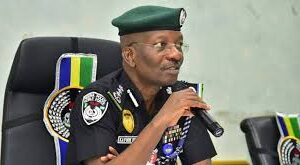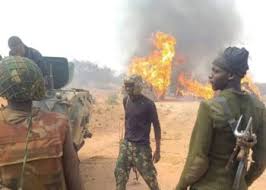Against the groundswell of opinions favouring that appeared to be tilting towards state-controlled police, Inspector General of Police Kayode Egbetokun said Nigeria was not ripe and mature for the initiative.
Rather, he said the myriad of challenges facing the force should be rightly addressed, while the recruitment of police personnel into the force should be increased by at least 30,000 annually to meet the minimum policing standard of the United Nations.
The IGP spoke Monday at the national dialogue on state policing organised by the House of Representatives and themed: “Pathways to Re-imagining Policing in Nigeria.”
At the gathering which held at the Intercontinental Hotel (former Sheraton Hotel) in Abuja, were President Bola Ahmed Tinubu represented by Vice President Kashim Shettima, Senate President Godswill Akpabio, Speaker of the Lower House, Tajudeen Abbas, former President Goodluck Jonathan and other major stakeholders.
…Egbetokun’s position
Speaking at the event, Egbetokun said: “It is the submission of the leadership of the Nigeria police Force that Nigeria is yet to mature for the establishment of state-controlled police.”
Represented by Assistant Inspector General (AIG) of Police Ben Okolo, the police boss said: “There have been renewed calls for the establishment of state police following an uptick in kidnappings, banditry and violent attacks across the country.
“On February 15, the federal government set up a committee to explore the creation of state police, amid the spate of insecurity in the country.
“On February 20, a bill to establish state police passed second reading at the House of Representatives.”
Rather than creating a state-controlled police, the IGP said the challenges bedevilling effective policing in Nigeria should be squarely addressed.
Egbetokun listed some of the challenges to include inadequate manpower, inadequate operational equipment such as vehicles, arms and ammunition, communication equipment, drones, aerial surveillance cameras, security surveillance helicopters, armoured vehicles, and inadequate training of personnel.
With this clarification, he said: “These challenges have impacted negatively on the performance of police personnel. He also said state police is open to abuse from powerful state governors,” adding “state governors could use the police force under their control for political or personal gain and compromise human rights and security. There would also be a conflict of jurisdiction.”
He further proposed the merger of the Nigeria Security and Civil Defence Corps (NSCDC) and the Federal Road Safety Corps (FRSC) as a department in the police.
“In view of this, the police leadership recommended the above instead of creating state police,” he said.
…Jonathan, Police affairs minister disagree
But in a sharp contrast, former President Jonathan and the police affairs minister, Senator Ibrahim Gaidam, said a more decentralised police force would check the rising security breaches across the country.
According to Jonathan, the issue of state police remained non-negotiable, as majority of Nigerians already agreed on the necessity, and that what the country needed now was the framework for the implementation.
Recalling his experience as deputy governor of Bayelsa state, Jonathan said “when we took over, the State was almost ungovernable. Gen Abdulsalami (Abubakar) will remember that when elections were to be conducted in December 1999, the security situation in Bayelsa State was so bad. Our elections were pushed to January 1999. The State was in crisis, the Niger Delta agitation was there and criminal elements were also operating in the creeks, posing all manner of havocs to market women and others.
“My boss then, Alamieyeseigha, had to set up Bayelsa Volunteers that worked with the police. We had to build stations around significant parts of the creeks and the boys volunteered to work with the police since they could not carry weapons. There is no way we can manage our internal security if states will not have their police. The issue is not States having their police but how they will function vis-a-vis the national security architecture.
“When I set up the 2014 national dialogue, during that period, we had a lot of challenges in the country. People were agitating in many areas and in one state, the whole local government delegates advocated for state police. When the matter came up, everybody supported…We cannot move away from the issue of state police.
“We should not waste our time debating whether we should have State police or not. We had it before in this country, the military scrapped it because of abuse. That is the area we should concentrate on. How do we manage State Police so that it will not be abused by state political actors? If State political actors are abusing state police and using it to harass and make life miserable for people who don’t belong to their political parties, will the commander in Chief sit down and watch, or will order the military to overrun the state police? The key areas we have to debate is how do we run the state police viz-a-Viz the national security.”
Toeing a similar line like Jonathan, the police affairs minister said: “It is clearly imperative to come together to discuss this critical issues and work towards finding sustainable solutions that will ensure the safety and security of all Nigerians.
“As we gather here today our objective is clear, to explore ways and means of addressing these issues including the possibility of establishing the state police force to combat the crises. I am here to highlight the merits and challenges of implementing state police in Nigeria. I will emphasize that state police can enhance local exclusiveness.”
…Akpabio wants inspiration from U.S., others
In his own contribution, Senate President Akpabio urged Nigeria to draw inspiration and lessons from the United States of America and other nations that have successfully implemented multi-level policing across the world.
He said: “Let us learn from their experiences and adapt their models to suit our unique socio-political context.
“Let us ensure that our state police forces work in harmony with their federal counterparts, collaborating to fight crime, preserve peace, and safeguard our democracy. In the USA, the FBI, the federal police body enforces federal laws and the state police departments enforce state laws. The FBI also investigates inter-state crimes.
“We must draw the lines because to have functional state police we must have a strong federal police. But let us never forget that the power of the state police should never be used as a tool of oppression. Let us ensure that political powers cannot manipulate the state police to silence dissent or target their enemies.
“Let us ensure that the influential do not exert undue influence over the state. police, and that justice is blind to wealth, power, politics, or status. Let us build a system that is fair, just, and equitable for all.”
Represented by Deputy Senate President Barau Jibrin, he said: “Today, we have the power to transform our security architecture and create a Nigeria where every citizen feels safe and protected, regardless of his or her status, religion, tribe, location or background.
“The concept of state police has been a topic of debate for many years. It is a complex issue with no easy answers. But today, courtesy of the House of Representatives, we have the opportunity to engage in a national dialogue, to listen to the voices of our fellow citizens, and to forge a path towards a more secure Nigeria. Let us seize this opportunity with open hearts and open minds. Let us listen to one another, learn from one another, and work together to find common ground.”
“President Tinubu did not only come to steady the ship of state, he came to adjust the sails and steer the ship of state through rough and fair weather, to the right direction and the right destination. He is known for rearranging the sails, and this is exactly what he did in agreeing that modalities should be worked out for us to have state police.
“In working out modalities for the state police and the security of our nation, we must not forget that security is not a privilege, but a fundamental right of every Nigerian. It is our duty to ensure that this right is upheld, that justice is served, and that the rule of law prevails.
“We must build a security architecture that is robust, transparent, and accountable. If we are to set up state police departments, we must ensure that they are free from the shackles of politics, religious extremism, tribalism, and ethnicism. We must empower them to serve and protect, without fear or favor,” Akpabio said.
…Reps’ speaker’s remarks
In his keynote address, Speaker Abbas clarified that the National Assembly had no fixed position on the matter.
“The House of Representatives is aware of the divisive and polarising arguments surrounding the issue under review. Let me state categorically that the House and indeed the National Assembly does not have a fixed position. Our role is to facilitate a dialogue and generate consensus.
“In discussions as significant as this, it is imperative that we approach each debate with objectivity and neutrality. We must acknowledge our biases and set them aside in favour of what is most beneficial for our dear country. Our discussions should be marked not by the pursuit of personal or political gains but by a steadfast commitment to the common good…
“Creating State Policing systems requires more than just legislative action; it requires a national consensus. As diverse and complex as our great country is, so too are the opinions and perspectives on how best to manage and implement local policing. It is only through open, inclusive, and respectful dialogue – like the one we are part of today – that we can build the necessary consensus,” the speaker said.
…Tinubu expresses support for NASS
In his remarks, President Tinubu assured his government would implement recommendations of the National Assembly on the creation of state police.
Speaking through Vice President Shetima, he said the government “believes that the path to effective security is through adaptive reforms catering to our diverse nature, and circumstances. This can only be achieved by carefully reviewing various options in the Nigerian context.
“This inclusive approach will guide us towards a a policing system that is most effective and respectful…The president is committed to listening to your recommendations and insights invariable to share in the policies that would lead us to a more secure and good society.”




